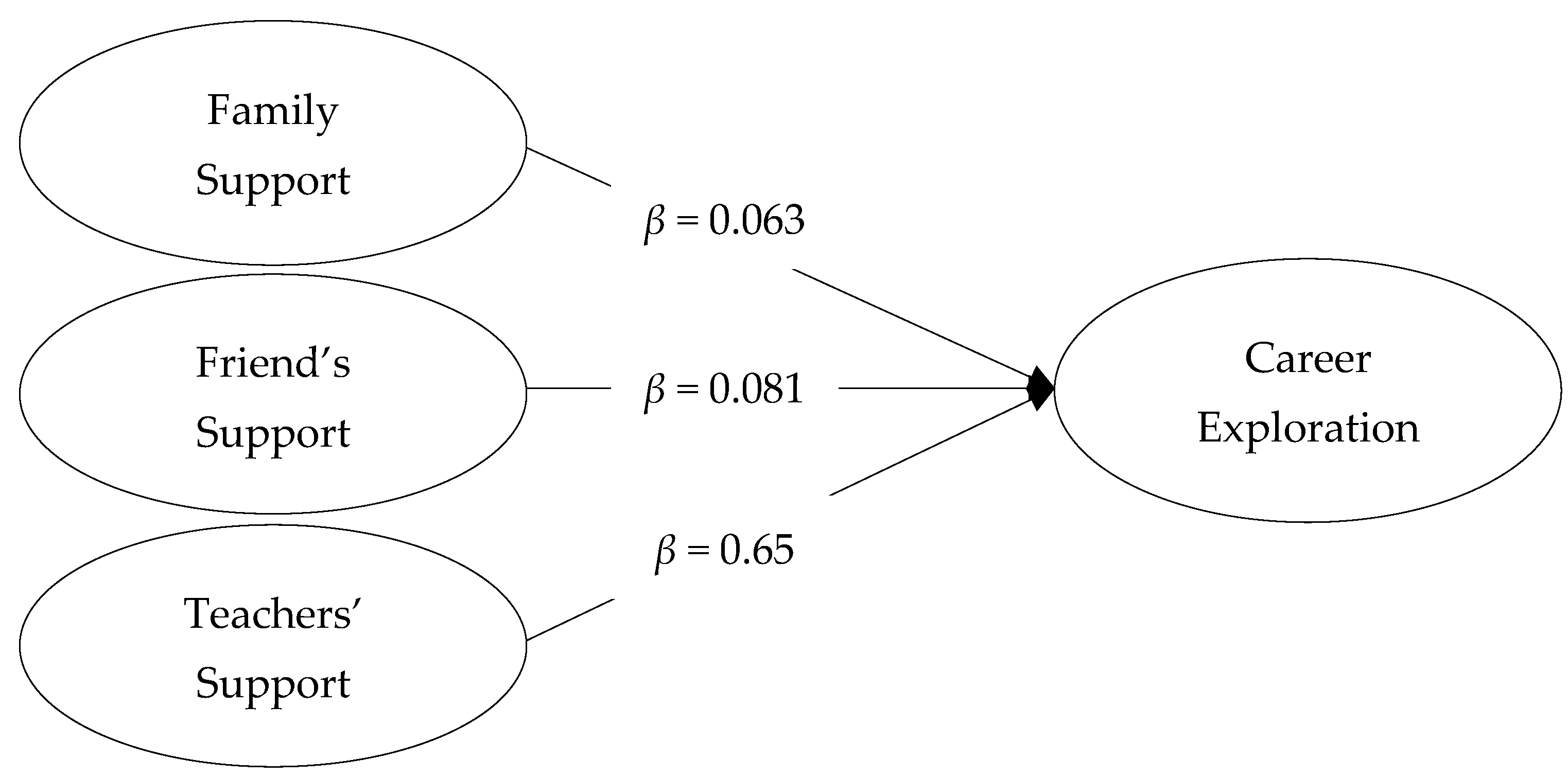The topic of an individual’s career choice has become very popular and interesting among researchers these days. Career exploration is a significant part of most professional decisions, and choosing a career is one of most difficult tasks in life according to Kosine and Lewis [
1]. The career development process is an ongoing, dynamic, and lifelong activity that needs to be carefully considered [
2,
3]. An individual explores activities, make decisions, and take on a variety of responsibilities through career exploration and career development [
3,
4]. Career development is linked to professional development [
5,
6] and involves the integration of educational, social, economic, physical, psychological, and chance factors that determine the nature and relevance of work across an individual’s life span [
3]. Adolescence is the beginning of a person’s career development that continues throughout all of his/her life [
7]. An individual in early life possesses two distinct stages of the career development process, which are career growth between the ages 4 and 13 and career exploration between the ages of 14 and 24 [
7,
8,
9]. Previous studies found that the four explicit indicators of career choice include career planning, career exploration, career decisiveness, and the activities that involve career planning [
10,
11].
Career exploration is a key component of most professional decisions. Career exploration is a term that refers to intentional behaviors and cognitions that facilitate job-seeking information, professions, and organizations that were not introduced in the field in the past [
12]. Career exploration is a multidimensional process of self-exploration considering the external environment, and it is the basic framework for career growth necessary for nurturing and expanding career development and job choice [
13]. The career exploration process is concerned with how, where, and how much an individual searches, as well as the directedness continuum [
13,
14]. Career searching/exploration is necessary to assist students in efficiently directing their struggle in finding a job [
1,
15], and it is a crucial stage in an adolescent’s career development because it is linked to the school-to-work transition [
7,
16,
17].
The investigation of identity and the formation of a core sense of self in connection with employment and career choices is among the most significant tasks for adolescents [
7]. Although some adolescents engage in career exploration on their own, others may require assistance or support from social networks such as family, friends, and peers [
18].
1.1. Career Exploration and Social Support
An important aspect related to the career exploration process is social support. Social support is perceived as providing support, assistance, or comfort to others, facilitating them to cope with psychological, biological, and social stressors in their life [
19]. Social support is usually described by the characteristics of the social environment, social networks, and the benefits that they bring [
20,
21]. The positive impacts of social support on career exploration have been described by researchers [
21,
22]. Social support as multifaceted conception is characterized by the information that enables people to believe they are cared for, respected, and loved [
23]. The psychological and material resources offered by an individual’s interpersonal relationships constitute social support [
23]. Social support occurs when individuals consider their social interaction advantageous [
24]. Support might occur from any interpersonal connection, including family members, friends, colleagues, or support groups [
20,
21]. The structural elements of a social network, as well as the perceived availability of resources, are indicated by social support [
20,
21]. Social support is a specific type of help provided by one’s family, peers, and colleagues to solve certain problems [
23]. Social support can be psychological or material resources provided by social networks such as friends, family members, and coworkers to help others [
23].
Social cognitive career theory states that cognitive characteristics, individual agency, and contextual aspects interact to grow a person’s career development [
10,
25,
26]. To date, research concentrating the prediction of career choices in the academic realm, as well as the evaluation of the career decision-making process of university students, has overwhelmingly supported in social cognitive career theory [
21]. Despite its contributions, this framework has yet to be used to discover the factors that influence students’ career choices. Lately, researchers have been found to be interested in investigating social–contextual elements that facilitate or hinder career development [
10,
21,
25,
27]. Research has explored strong associations of high levels of perceived social support with one’s belief about choosing a specific career [
21,
22,
28]. For example, Chan conducted a study on the relationship among the social support, career exploration, career choice, and career self-efficacy of college students in Taiwan [
21]. He found a strong positive association between the social support and career exploration of students [
21]. Furthermore, Hui et al. found a significant association between perceived social support and career adaptability among adolescents in Hong Kong [
22]. It was also reported in a previous study that teachers’ behavior and motivation played a significant role in career choice by the students [
29]. Moreover, students’ career decision-making and social support from family and teachers were positively associated in a study in Bangladesh [
30]. Interacting with parents, coaches, and peers, as well as receiving support from them, might boost students’ confidence in dealing with challenges related to career development [
10,
25]. Family support has a significant impact on one’s career choices and self-efficacy [
21,
31,
32,
33]. Furthermore, it is believed that when adolescents face goals such as continuing their education or starting a career after graduation, parental and teacher support had a beneficial impact on career exploration and choice [
21,
31,
33,
34].
Jiang argued that it is required to incorporate a vibrant life-span perspective to enhance our knowledge regarding career exploration and examine the multilevel factors and mechanisms involved in career exploration or self-exploration regarding work [
8]. Further, Turan [
27] analyzed the effect of perceived social support as far as the career exploration of adolescents is concerned. The authors found that peer support, family support, and significant others substantially precited career exploration among adolescents, suggesting the exploration of multilevel effects on career exploration [
27]. Nevertheless, an extensive study emphasizing the psychological factors that may help career choice is required. Lately, detailed studies based on an appropriate theoretical framework that could explicitly provide the backdrop for interventions designed to support university students in the process of making career choices is required. The relationship between perceived social support from family, peers/friends, and teachers and career exploration has not been studied yet, particularly in the context of Pakistani university students.
1.2. The Current Study
Although the previous research has addressed the factors influencing the career development, career decision-making, and career choice of adolescents in Pakistan, there are a lot of gaps to fill in the current body of knowledge. Furthermore, not all sources of social support have been described in a concurrent model like in the present study. For instance, a study in Pakistan exhibited the positive effect of family on the career choice of undergraduate university students in Pakistan; however, other significant sources of social support, such as friends and teachers, were not included [
35]. Moreover, there is research describing different results than the previous one. For example, Sharif et al. conducted a study on factors affecting students’ career choice [
36]. The authors found a significant effect of fathers on the career choice of their children, but no statistical influence of mothers and tutors on students’ career choice, which is quite surprising [
36]. On the other hand, the research did not see the effect of peers/friends, which has been reported to be a stronger predictor of career exploration than other sources of social support [
37]. The current study also includes the effect of peers’ or friends’ support on the career exploration of adolescents. There is only once exception considering all sources of social support affecting students’ academic career choice in Pakistan [
37]. However, the sample was taken from only one university. A study with a larger sample may generate different results. Furthermore, Akosah et al. presented a systematic review on the factors influencing career choice by focusing on the role of culture [
38]. The authors found that the adolescents in a collectivistic culture such as Pakistan are mainly influenced by the parents or family expectations [
38]. It is further argued that further research is imperative to guide the understanding of parental influence and diversity. Above all, Pakistan is in the process of creating a career guidance system that is affected by political, cultural, and professional challenges [
39]; therefore, research on factors affecting career-related constructs would be of great importance to understand and grow the system effectively.
Based on the abovementioned literature and social cognitive career theory, the current study was designed to investigate social support and career exploration in a concurrent model. The aim was to look into the relationship between perceived social support and career exploration. Career exploration was considered as an outcome, whereas perceived social support was considered as a predictor variable in this study. The hypothesis was the positive association of perceived social support with career exploration. Social support was found to be involved in making the transition from school to professional life smoothly [
40]. The purpose was to verify whether perceived social support predicts adolescent career exploration. This viewpoint implies that some elements viz perceived social support from friends, parents, and significant others impacts career development.








